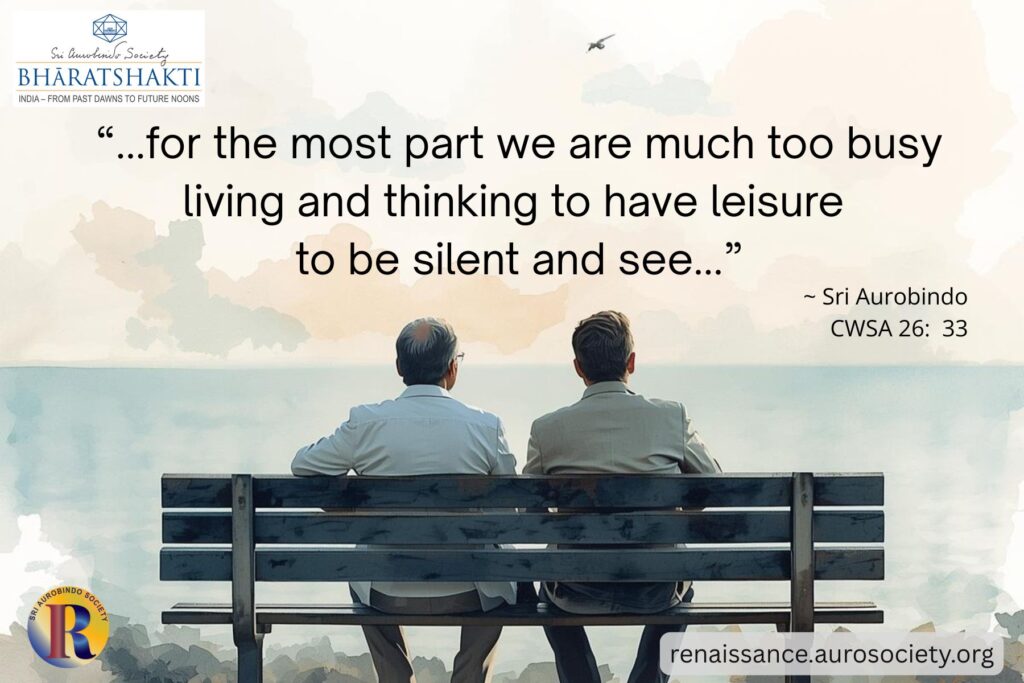Editor’s note: In the Guiding Light feature we present selected passages from the Mother on the meaning of true maternity, conscious conception, pregnancy and parenting. Several other aspects related to these themes are explored in other offerings in this issue.

True Maternity
Maternity is considered as the principal role of woman. But this is true only so long as we understand what is meant by the word maternity. For to bring children into the world as rabbits do their young—instinctively, ignorantly, machine-like, that certainly cannot be called maternity! True maternity begins with the conscious creation of a being, with the willed shaping of a soul coming to develop and utilise a new body. The true domain of women is the spiritual. We forget it but too often.
To bear a child and construct his body almost subconsciously is not enough. The work really commences when, by the power of thought and will, we conceive and create a character capable of manifesting an ideal.
And do not say that we have no power for realising such a thing. Innumerable instances of this very effective power could be brought out as proofs.
First of all, the effect of physical environment was recognised and studied long ago. It is by surrounding women with forms of art and beauty that, little by little, the ancient Greeks created the exceptionally harmonious race that they were.
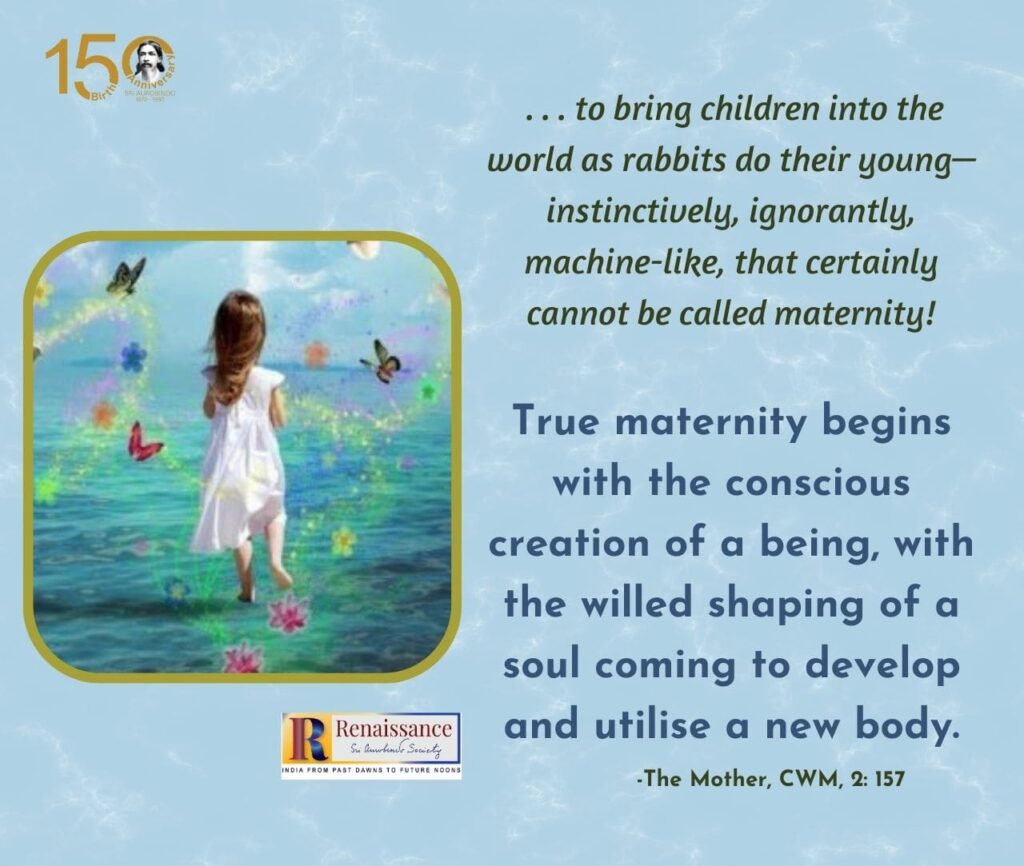
Individual instances of the same fact are numerous. It is not rare to see a woman who, while pregnant, had looked at constantly and admired a beautiful picture or statue, giving birth to a child after the perfect likeness of this picture or statue.
I met several of these instances myself. Among them, I remember very clearly two little girls; they were twins and perfectly beautiful. But the most astonishing was how little like their parents they were. They reminded me of a very famous picture painted by the English artist Reynolds.
One day I made this remark to the mother, who immediately exclaimed: “Indeed, is it not so? You will be interested to know that while I was expecting these children, I had, hanging above my bed, a very good reproduction of Reynolds’ picture. Before going to sleep and as soon as I woke, my last and first glance was for that picture; and in my heart I hoped: may my children be like the faces in this picture. You see that I succeeded quite well!” In truth, she could be proud of her success, and her example is of great utility for other women.
But if we can obtain such results on the physical plane where the materials are the least plastic, how much more so on the psychological plane where the influence of thought and will is so powerful.
Why accept the obscure bonds of heredity and atavism—which are nothing else than subconscious preferences for our own trend of character—when we can, by concentration and will, call into being a type constructed according to the highest ideal we are able to conceive?
With this effort, maternity becomes truly precious and sacred; indeed with this, we enter the glorious work of the Spirit, and womanhood rises above animality and its ordinary instincts, towards real humanity and its powers.
In this effort, in this attempt, then, lies our true duty. And if this duty was always of the greatest importance, it certainly has taken a capital one in the present turn of the earth’s evolution.
* * *
State of Consciousness at the Moment of Conception
Even as the state of consciousness of the last moments of life is of capital importance for the future of the one who is departing, so too the state of consciousness in which the parents are at the moment of conception gives a sort of stamp to the child, which it will reflect throughout its life.
So, these are apparently such little things—the mood of the moment, the moment’s aspiration or degradation, anything whatsoever, everything that takes place at a particular moment—it seems to be so small a thing, and it has so great a consequence: . . . And people are not aware of that.
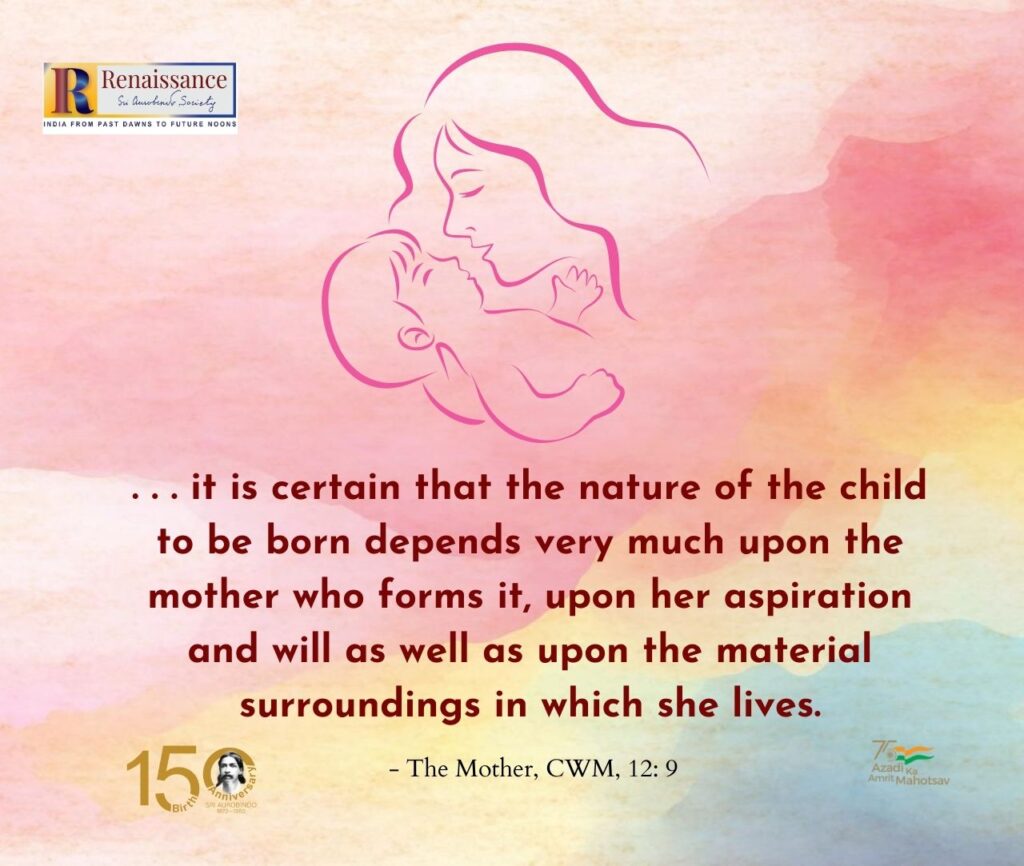
Significance of Mother’s Aspiration and Will
For it is certain that the nature of the child to be born depends very much upon the mother who forms it, upon her aspiration and will as well as upon the material surroundings in which she lives.
To see that her thoughts are always beautiful and pure, her feelings always noble and fine, her material surroundings as harmonious as possible and full of a great simplicity—this is the part of education which should apply to the mother herself.
And if she has in addition a conscious and definite will to form the child according to the highest ideal she can conceive, then the very best conditions will be realised so that the child can come into the world with his utmost potentialities. How many difficult efforts and useless complications would be avoided in this way!
* * *
Importance of Environment during Pregnancy and Child Birth
In many countries of old―and even now in certain countries―the woman who was going to have a child was placed in special conditions of beauty, harmony, peace and well-being, in very harmonious physical conditions, so that the child could be formed in the best possible conditions.
This is obviously what ought to be done, for it is within the reach of human possibilities. Human beings are developed enough for this not to be something quite exceptional. And yet it is quite exceptional, for very few people think of it, while there are innumerable people who have children without even wanting to. . .
It is possible to call a soul, but one must be at least a little conscious oneself, and must want to do what one does in the best conditions. This is very rare, but it is possible.
* * *
. . . the mother, throughout the gestation, should be in an atmosphere absolutely protected from all degrading influences: an ideally beautiful place, a wonderful climate where everything is harmonious, and a wholly spontaneous, free and harmonious and beautiful life sheltered from all vulgarities of life.
And the mother herself should have the ideal of the new child. It should be done not as a mechanical but as a conscious, willed thing in an absolutely “creative” atmosphere, we might say.
* * *
Someone asked about proper arrangements for the birth of an Auroville child. Mother advised that only the doctor and the father should be present, and added:
The most important thing is to be quiet, in a peaceful atmosphere so that the Force can work without disturbance.
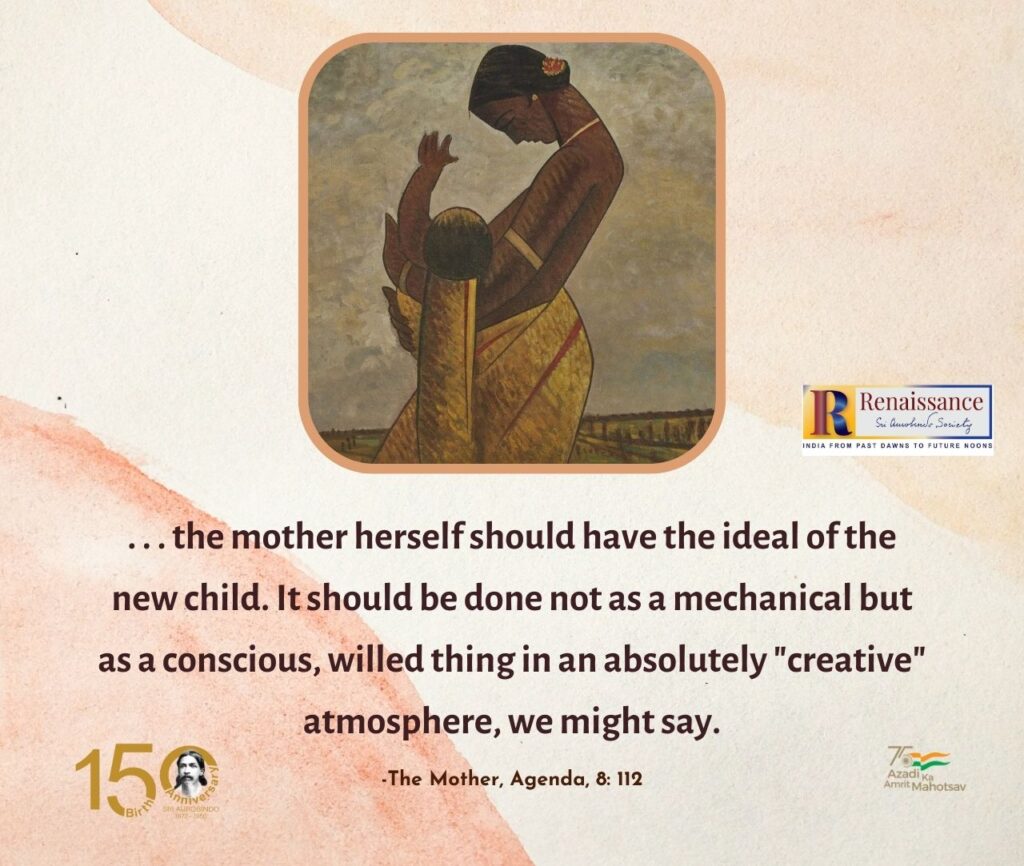
Do the Souls Choose their Parents?
Disciple: When great souls want to be born upon earth, do they choose their parents?
The Mother: Ah! that depends on their state of consciousness, it depends on the state of their psychic formation. If the psychic being is completely formed, if it has reached the perfection of its being and is free to reincarnate or not, it has also the capacity of choosing.
But I believe I have explained that to you already. They don’t have a physical sight like ours so long as they are not in a body. So, evidently, they look for a body which is adapted and fit to express them, but they must give its share to the material inconscience, if it may be put thus, and to the necessity to adapt themselves to the most material laws of the body.
So, from the point of view of the psychic, the choice of the place where one is born is important, it is more than an insignificant detail.
But there are so many things that can’t be foreseen. For instance, one chooses an environment, a country, a certain type of family, one tries to see the nature of the likely parents, one asks for certain already well-developed qualities in them and a sufficient self-mastery.
But all this is not enough if one does not carry in oneself a sufficient dynamism to overcome the obstacles. So, all things considered, this is not enormously important.
Anyhow, even at the best, even if the parents have collaborated consciously, there is an enormous mass of the subconscient and the yet lower inconscient which from time to time rises again to the surface, gets stirred up, damages the work, makes calmness and silence indispensable.
Always, always a preparation is needed, even if one has chosen—a long preparation. Not to speak of the phenomenon of being half-stunned at the moment of birth, the descent into the body, which often lasts for a very long time before one can escape from it completely.
* * *
Does a Strong Physicality Help at the Time of the Child Birth?
. . . women who are trained to strong exercises and have a muscular body go through the ordeal of child-formation and child-birth much more easily and painlessly.
I heard the authentic story of one of these African women who are accustomed to walk for miles carrying heavy loads. She was pregnant and the time of delivery came during one of the day’s marches. She sat on the side of the track, under a tree, gave birth to the child, waited for half an hour, then she rose and adding the new-born babe to the former luggage, went on her way quietly, as if nothing had happened.
This is a splendid example of what a woman can do when she is in full possession of her health and strength.
Doctors will say that such a thing cannot occur in a civilised world with all the so-called progress that humanity has achieved; but we cannot deny that, from the physical point of view, this is a more happy condition than all the sensitiveness, the sufferings and the complications created by the modern civilisations.
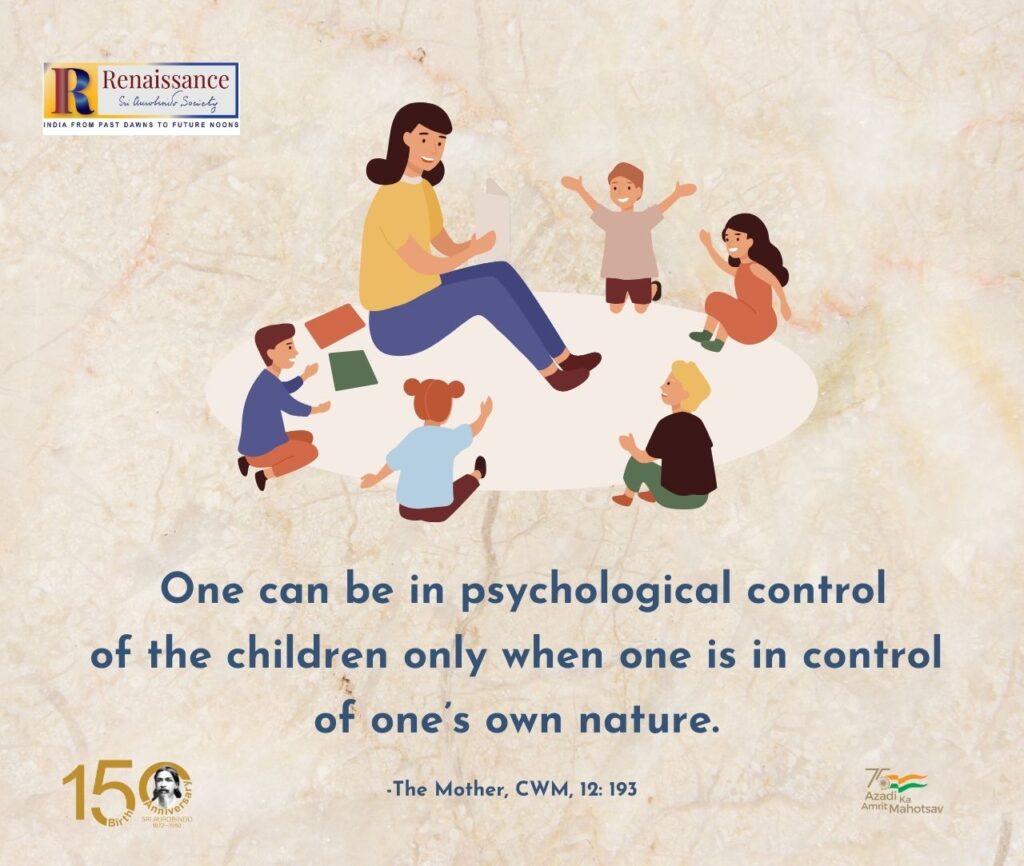
Also read:
“The Superman Shall be Born of Woman”
Some Guidance on Conscious Parenting
To be mindful of the child’s contact with servants, other children
. . . to leave [the] children with servants. It is a crime. For these people have an altogether vulgar consciousness, altogether low, altogether obscure; and quite spontaneously, without wanting to do so, they let it enter the children. Naturally, there is also the age when children are put to school and there they begin to come in contact with a host of children whose company is not always quite desirable. It is very difficult to avoid these relations.
But all the same, if one has started life with a little consciousness and much goodwill, when one meets people who are not desirable company, one feels it. And if one is good-willed, immediately one tries not to see them or not to be with them.
* * *
The most essential thing to do in order to be able to educate a child
. . . know that the first thing to do, in order to be able to educate a child, is to educate oneself, to become conscious and master of oneself so that one never sets a bad example to one’s child. For it is above all through example that education becomes effective. To speak good words and to give wise advice to a child has very little effect if one does not oneself give him an example of what one teaches.
Sincerity, honesty, straightforwardness, courage, disinterestedness, unselfishness, patience, endurance, perseverance, peace, calm, self-control are all things that are taught infinitely better by example than by beautiful speeches.
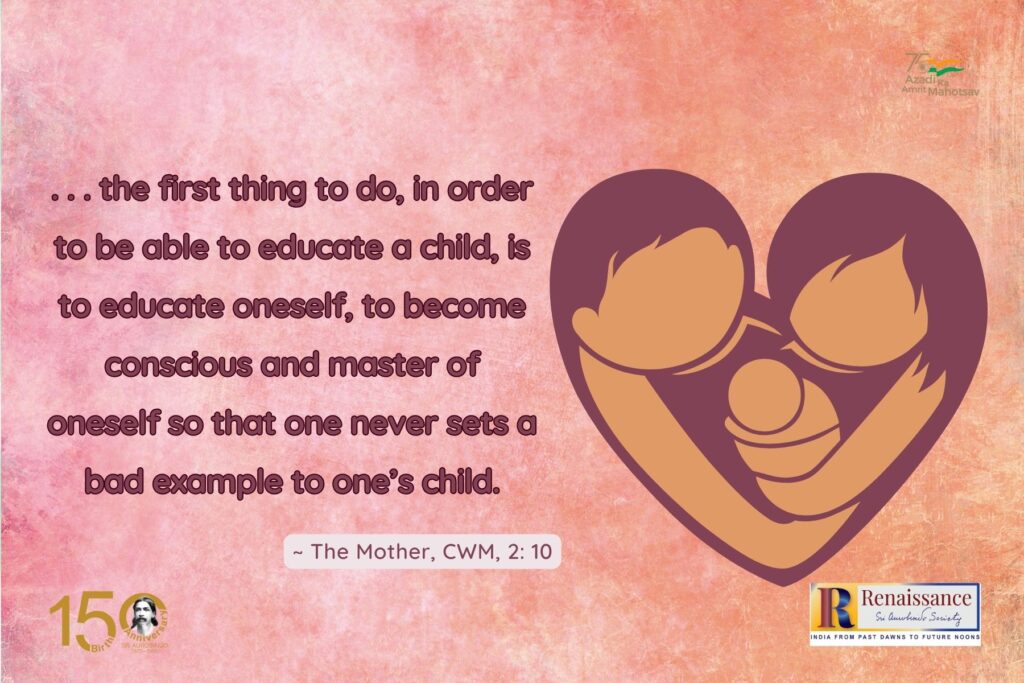
Teaching children to respect the parents
With very few exceptions, parents are not aware of the disastrous influence that their own defects, impulses, weaknesses and lack of self-control have on their children. If you wish to be respected by a child, have respect for yourself and be worthy of respect at every moment.
Never be authoritarian, despotic, impatient or ill-tempered.
When your child asks you a question, do not give him a stupid or silly answer under the pretext that he cannot understand you. You can always make yourself understood if you take enough trouble; and in spite of the popular saying that it is not always good to tell the truth, I affirm that it is always good to tell the truth, but that the art consists in telling it in such a way as to make it accessible to the mind of the hearer.
In early life, until he is twelve or fourteen, the child’s mind is hardly open to abstract notions and general ideas. And yet you can train it to understand these things by using concrete images, symbols or parables. Up to quite an advanced age and for some who mentally always remain children, a narrative, a story, a tale well told teach much more than any number of theoretical explanations.
* * *
“Do not scold your child without good reason and only when it is quite indispensable.”
A child who is too often scolded gets hardened to rebuke and no longer attaches much importance to words or severity of tone. And above all, take good care never to scold him for a fault which you yourself commit. Children are very keen and clear-sighted observers; they soon find out your weaknesses and note them without pity.
When a child has done something wrong, see that he confesses it to you spontaneously and frankly; and when he has confessed, with kindness and affection make him understand what was wrong in his movement so that he will not repeat it, but never scold him; a fault confessed must always be forgiven.
You should not allow any fear to come between you and your child; fear is a pernicious means of education: it invariably gives birth to deceit and lying.
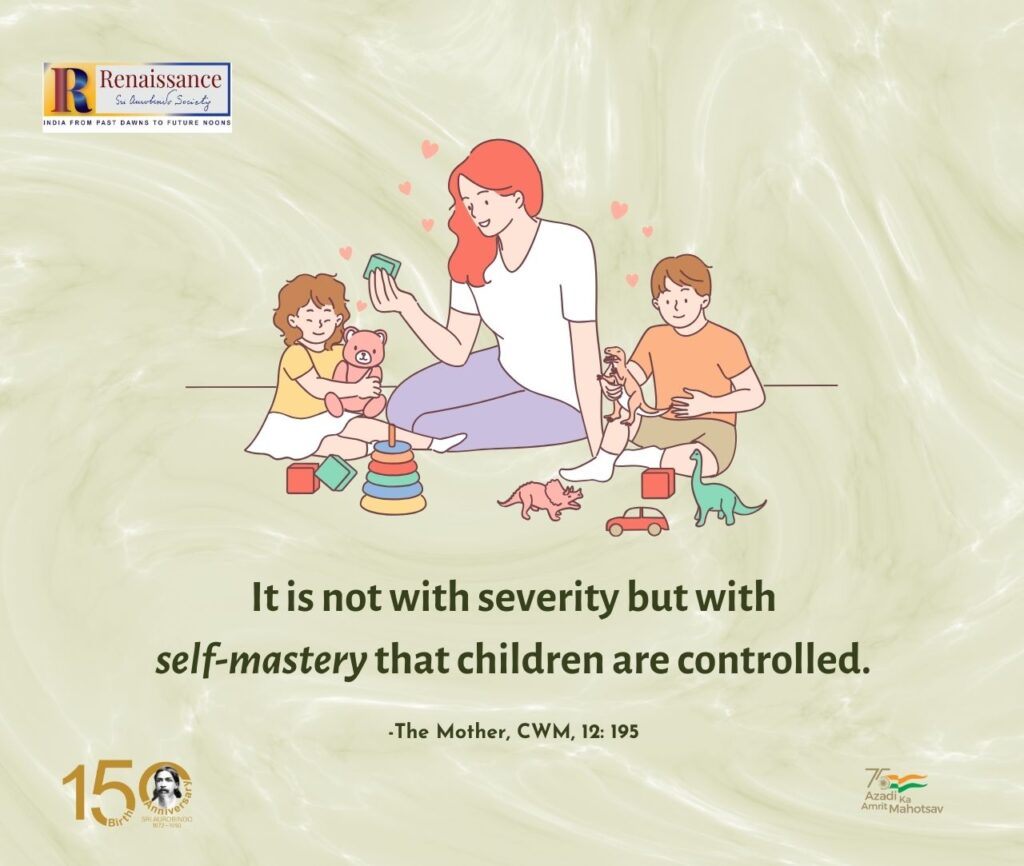
Only a discerning affection that is firm yet gentle and an adequate practical knowledge will create the bonds of trust that are indispensable for you to be able to educate your child effectively.
And do not forget that you have to control yourself constantly in order to be equal to your task and truly fulfil the duty which you owe your child by the mere fact of having brought him into the world.

~ Design: Beloo Mehra and Biswajita Mohapatra



